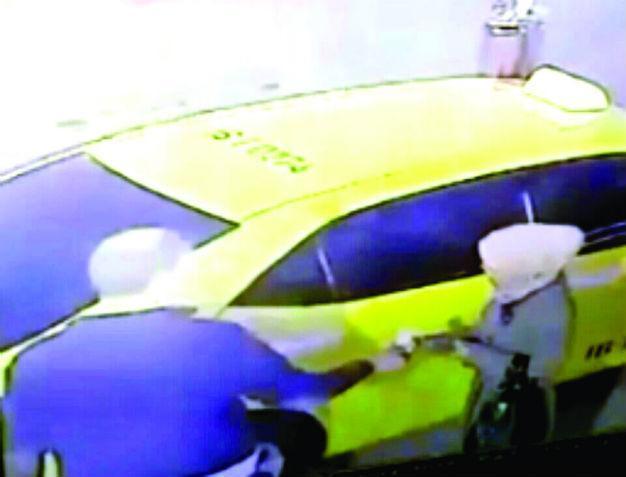Police working to confirm Bursa suicide bomber’s identity
ISTANBUL

Police believe the suicide bomber who killed herself and wounded 13 others in Turkey’s northwestern province of Bursa on April 28 was a woman identified as Suzan B., according to reports citing intelligence sources.
According to the claims, police have taken DNA samples from the suspect’s family members in the southeastern province of Mardin and are working to confirm her identity.
Turkish police discovered Suzan B. after following evidence found on the bomber’s body: A ticket from Şanlıurfa to Bursa organized for a passenger named “Sultan” and two identity cards with the names Emine Kızıl and Sultan Yıldız.
The ticket showed that the woman had traveled from Şanlıurfa on April 23 and arrived at Bursa’s bus terminal at around 6 p.m. the same day.
Police later discovered video footage of the bomber from a security camera in the terminal. Reports claim that image-matching software used with the footage had provided a match with Suzan B., a woman officially registered in Mardin.
DNA samples were subsequently taken from Suzan B.’s family members in Mardin.
Meanwhile, simultaneous operations were launched across Turkey in the provinces of Bursa, Istanbul, Afyon and Şanlıurfa late on April 27, detaining 16 suspects including Emine Kızıl and Sultan Yıldız.
Another suspect, identified only by the initials K.O., who is allegedly a friend of the suicide bomber, was also detained, according to reports. All three women are being interrogated in order to determine their links to the attacker, reports added.
The allegations also include details of the bomber’s time in Bursa, where she reportedly stayed in a short-term rental apartment in the Görükle neighborhood of the city’s Nilüfer district.
Police purportedly raided the suspect’s rented apartment at 2 p.m. on April 28 and seized documents possibly related to the attack. Reports claim that up to four people rented the house seven months ago, posing as students.
Once in Bursa, the attacker allegedly spent four days mapping the city out and, on the day of the attack, took a cab to the central Ulu Camii, a mosque near which she detonated herself on April 28.
Reports also include claims that Suzan B. was a militant of the outlawed Kurdistan Workers’ Party (PKK) and crossed the border into Syria to fight in Kobane in the ranks of the Syrian Kurdish People’s Protection Units (YPG), which Turkey considers a terrorist organization and an offshoot of the PKK.
However, reports about the suicide bomber’s identity have yet to be confirmed and no official statement has been made regarding the terror organization behind the attack.
“Efforts and investigation are ongoing with regards to the identity of the person who committed the terror attack. We have found information on this person’s links and the terror organization on whose behalf this act was committed but I will not make a declaration until all procedures are completed,” Interior Minister Efkan Ala said on April 28 during a hospital visit to victims of the blast alongside Health Minister Mehmet Müezzinoğlu.
Meanwhile, scores of citizens arrived at the Ulu Camii, the site of the April 27 explosion, for Friday prayers, gathering in solidarity against the attack.
The mosque was reportedly at full capacity and people had to perform prayers on the sidewalks outside the complex.
Bursa Governor Münir Karaloğlu, Uludağ University President Professor Yusuf Ulcay and Bursa Chamber of Commerce and Industry head İbrahim Burkay also joined the prayers amid strict security measures.
“This attack that took place in our peaceful and grand city of Bursa, targeting innocent lives right near our Ulu Camii two days ago [April 27], demonstrated once again that terror has no religion nor sacred values,” a sermon announced on all of Bursa’s mosques said, extending condolences to victims and locals alike.
Turkey has faced a series of suicide bomb attack organized by both the Islamic State of Iraq and the Levant (ISIL) and the PKK in recent months.
Two suicide bombers, believed to be ISIL-linked militants, detonated themselves on 10:04 a.m. on Oct. 10, 2015, in front of Ankara’s main train station, where thousands of people had gathered for a peace rally a few weeks before the snap election on Nov. 1, 2015. The attack, which left over 100 dead, was the largest terror attack in Turkey’s history.
ISIL also hit Istanbul’s historic Sultanahmet Square on Jan. 12 and the touristic İstiklal Avenue on March 19.
 Police believe the suicide bomber who killed herself and wounded 13 others in Turkey’s northwestern province of Bursa on April 28 was a woman identified as Suzan B., according to reports citing intelligence sources.
Police believe the suicide bomber who killed herself and wounded 13 others in Turkey’s northwestern province of Bursa on April 28 was a woman identified as Suzan B., according to reports citing intelligence sources.